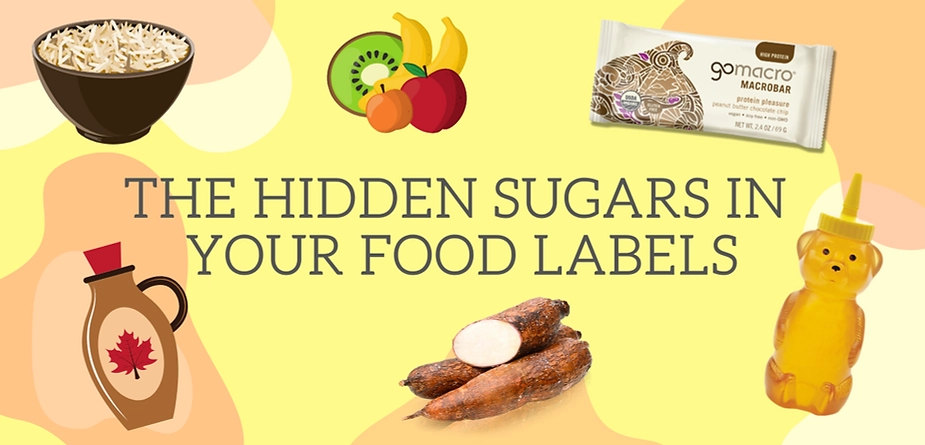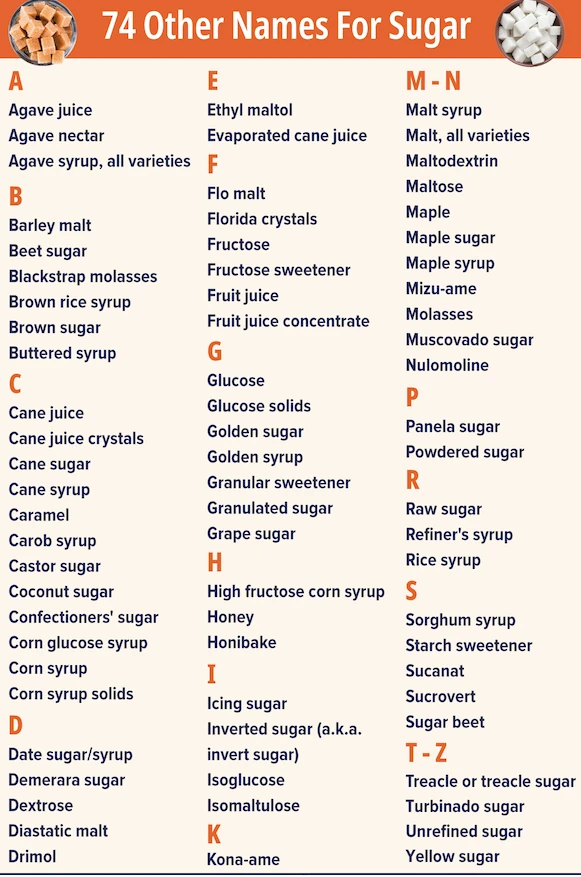
Let’s take our power back! We have choice over what we purchase to put in our refrigerators, on our tables, and in our mouths! Here are some things to know about food labels:
- The fewer ingredients, the better
- The first ingredient listed on the label is the primary ingredient
- Sugar is a master of disguise. Just because you don’t see “sugar” on the ingredient list when scanning a nutrition label does not guarantee the item is sugar or sweetener-free
There are several “synonyms” for sugar that you should be aware of – at least 56 of them! Sugar goes by a slew of different names, making it easy for manufacturers to hide how much sugar is truly in a given product. While some of these names are more obvious, like brown and cane sugar, others are trickier to spot (e.g., maltodextrin and dextrose). Shockingly, over 68% of barcoded food products sold in the U.S. contain added sweeteners—even if they are labeled as “natural” or “healthy.”
Added sugar =
“sugars that are added during the processing of foods…and include sugars (free, mono- and disaccharides), sugars from syrups and honey, and sugars from concentrated fruit or vegetable juices….” FDA 2016

Sugar is sneaky, and can appear where you least expect it. There are the more obvious items like cakes, sweets, sodas, and table sugar that you might add to your morning coffee. But it can also hide out in things like sauces, salad dressings, granola bars, and pre-made foods. Even fruit – while it’s considered “natural” – contains sugar.
If you can’t pronounce it or picture what it looks like in nature, you probably shouldn’t be consuming it.
Sugar synonyms – the most common names for sugar (Excluding artificial sweeteners and sugar substitutes):
Basic Simple Sugars (monosaccharides and disaccharides):
- Dextrose
- Fructose
- Galactose
- Glucose
- Lactose
- Maltose
- Sucrose
Solid or Granulated Sugars:
- Beet sugar
- Brown sugar
- Cane juice crystals
- Cane sugar
- Castor sugar
- Coconut sugar
- Confectioner’s sugar (aka, powdered sugar)
- Corn syrup solids
- Crystalline fructose
- Date sugar
- Demerara sugar
- Dextrin
- Diastatic malt
- Ethyl maltol
- Florida crystals
- Golden sugar
- Glucose syrup solids
- Grape sugar
- Icing sugar
- Maltodextrin
- Muscovado sugar
- Panela sugar
- Raw sugar
- Sugar (granulated or table)
- Sucanat
- Turbinado sugar
- Yellow sugar
Liquid or Syrup Sugars:
- Agave Nectar/Syrup
- Barley malt
- Blackstrap molasses
- Brown rice syrup
- Buttered sugar/buttercream
- Caramel
- Carob syrup
- Corn syrup
- Evaporated cane juice
- Fruit juice
- Fruit juice concentrate
- Golden syrup
- High-Fructose Corn Syrup (HFCS)
- Honey
- Invert sugar
- Malt syrup
- Maple syrup
- Molasses
- Rice syrup
- Refiner’s syrup
- Sorghum syrup
- Treacle
Food Addiction-Informed abstinence starts with abstaining from sugar in all forms from your diet – the obvious sugar laden baked goods, chocolate and candy, as well as the less obvious sugar ingredients that are hidden in the processing and used to increase the palatability of processed foods to increase shelf life, texture and color.